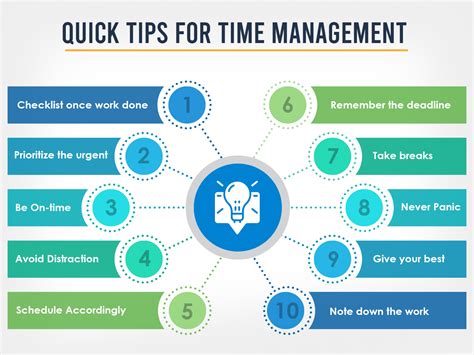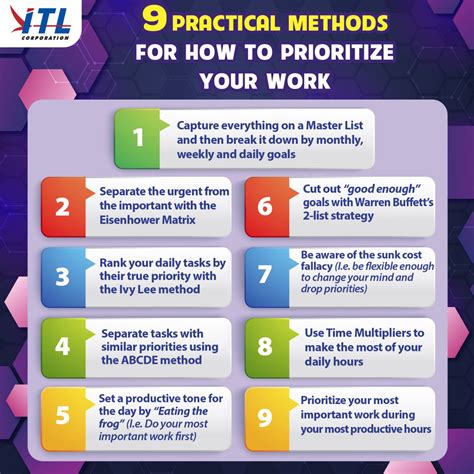In today's fast-paced world, effectively managing your time is crucial for success in both personal and professional endeavors. The way we allocate our time can have a profound impact on productivity, stress levels, and overall satisfaction. It is a skill that can be honed and refined with practice, leading to better organization, improved focus, and increased productivity.
Without proper time management, individuals often find themselves overwhelmed and defeated by the sheer number of tasks and responsibilities they need to juggle. By implementing a selection of proven strategies, anyone can enhance their ability to maximize productivity, make progress towards their goals, and lead a more balanced and fulfilling life.
One essential aspect of efficient time management is prioritization. By identifying and focusing on the most important tasks first, individuals can ensure that their time is allocated effectively. This involves differentiating between urgent and non-urgent tasks, as well as considering the long-term impact and potential consequences of each activity. Setting clear goals and objectives is another critical element to ensure that time and effort are being channeled towards meaningful outcomes. By having a clear vision of what needs to be accomplished, individuals can maintain focus and avoid wasting time on unnecessary activities.
Another strategy for enhancing time management skills is effective planning and scheduling. Breaking down larger tasks into smaller, more manageable segments can help prevent procrastination and increase motivation. Additionally, allocating specific time slots for different activities can help create structure and reduce the likelihood of time wasted on unproductive tasks. Flexibility, however, is also essential. Being open to adjusting the schedule when unforeseen circumstances arise is crucial for maintaining adaptability and avoiding unnecessary stress.
10 Strategies to Enhance Your Time Management Skills

In today's fast-paced world, being able to effectively manage your time is essential for success. These strategies aim to help you optimize your use of time and improve your ability to prioritize tasks, meet deadlines, and achieve your goals.
- Establish Clear Priorities: Determine what tasks and activities are most important to you and align your time and energy accordingly.
- Manage Procrastination: Overcome the tendency to delay tasks by breaking them down into smaller, manageable steps and setting deadlines for each.
- Utilize Time Tracking Tools: Take advantage of time tracking apps or software to monitor how you spend your time and identify areas for improvement.
- Create a Daily Schedule: Plan your day ahead by allocating specific time slots for different activities, ensuring a balanced and efficient use of your time.
- Practice Effective Goal Setting: Set specific, measurable goals and create a timeline to keep yourself accountable and motivated.
- Minimize Distractions: Identify and eliminate or minimize distractions that hinder your productivity, such as social media notifications or unnecessary meetings.
- Delegate Responsibility: Delegate tasks that can be handled by others, freeing up your time to focus on high-priority activities that require your expertise.
- Improve Decision Making: Enhance your decision-making skills to make quicker and more informed choices, reducing time spent on unnecessary deliberations.
- Prioritize Self-Care: Taking care of your physical and mental well-being allows you to maintain high energy levels and focus, increasing your productivity.
- Learn to Say No: Be selective in accepting additional commitments, ensuring that you have enough time and resources to fulfill existing responsibilities effectively.
By incorporating these strategies into your daily routine, you can enhance your time management skills and create a more efficient and productive lifestyle. Remember, effective time management is about making the most of each moment while actively working towards your goals.
Set Clear Priorities and Goals
When it comes to managing your time effectively, a crucial aspect is setting clear priorities and goals. By identifying what is most important and establishing specific objectives, you can streamline your tasks and focus your efforts on what truly matters.
First and foremost, take the time to assess your current commitments and obligations and prioritize them based on their significance and urgency. Determine which tasks are essential to your long-term goals and place them at the top of your list. This will help you allocate your time and resources efficiently and prevent you from being overwhelmed by less important tasks.
Additionally, consider breaking down your broader goals into smaller, more manageable milestones. This allows you to approach your objectives in a structured manner, enabling you to track your progress and stay motivated along the way. By setting clear and specific goals, you provide yourself with a sense of direction and purpose, making it easier to prioritize your tasks and make informed decisions about how to spend your time.
To further support your time management efforts, consider creating a visual representation of your priorities and goals. This can be done through a table or a matrix, where you can categorize and rank your tasks based on their importance and urgency. By visually organizing your responsibilities, you gain a clearer understanding of where to allocate your time and energy.
Remember, setting clear priorities and goals is not only about managing your time efficiently, but also about aligning your actions with your overall aspirations and values. By defining what matters most to you and committing to the pursuit of those priorities, you can ensure that your time is spent purposefully and meaningfully.
Master the Art of Time-Blocking Technique

In today's fast-paced world, efficiently managing our time has become a valuable skill. One method that can greatly improve your productivity is the utilization of the time-blocking technique. This technique involves dividing your day or week into specific blocks of time dedicated to different tasks or activities.
The key to successfully implementing the time-blocking technique lies in effectively planning and prioritizing your activities. By systematically allocating specific time slots for each task, you can eliminate distractions, increase focus, and maximize productivity. This technique allows you to stay organized and ensures that you have sufficient time allocated for essential tasks.
One of the main advantages of time-blocking is its flexibility. By customizing your schedule to suit your unique needs and preferences, you can allocate the appropriate time for different types of work. For instance, you can dedicate focused blocks of time for important projects that require intense concentration, while also ensuring breaks for rest and rejuvenation.
Time-blocking also helps in ensuring a balanced workload by preventing overcommitting or underutilizing your time. By visually mapping out your day or week through a table or a digital calendar, you can have a clear overview of your commitments and identify potential time gaps for additional tasks or personal activities.
Additionally, the time-blocking technique helps in managing interruptions and maintaining boundaries. By setting designated blocks of time for specific tasks, you can politely decline requests or distractions that don't align with your scheduled activities. This technique promotes discipline and reduces the likelihood of procrastination or multitasking.
Ultimately, mastering the art of time-blocking can significantly enhance your time management skills and overall productivity. By implementing this technique, you can experience increased efficiency, reduced stress levels, and a greater sense of accomplishment in both your personal and professional life.
| Advantages of Utilizing Time-Blocking Technique | Key Points |
|---|---|
| Eliminates distractions | Stay focused on specific tasks |
| Maximizes productivity | Efficiently allocate time for essential activities |
| Customizable and flexible | Adapt to individual preferences and work requirements |
| Prevents overcommitment or underutilization | Balances workload and identifies time gaps |
| Manages interruptions and maintains boundaries | Promotes discipline and minimizes distractions |
| Enhances overall productivity and reduces stress | Increased efficiency and sense of accomplishment |
Eliminate Distractions
In order to enhance productivity and make the most of your time, it is crucial to minimize any potential distractions that may interfere with your focus. By eliminating interruptions and disturbances, you can optimize your workflow and improve your overall efficiency.
One effective method to eliminate distractions is to create a designated workspace. Find a quiet and organized area where you can concentrate solely on your tasks without any disruptions. It is important to remove any objects or devices that may divert your attention, such as mobile phones or unnecessary clutter.
Another strategy to reduce distractions is to manage your digital environment. Turn off notifications on your electronic devices or place them in silent mode to avoid constant interruptions. Consider using productivity apps or browser extensions that can help block distractions, such as social media or non-work-related websites, during designated work periods.
Additionally, establishing a clear schedule and setting specific time blocks for focused work can be beneficial in eliminating distractions. By designating specific hours for concentrated effort, you can train your mind to stay focused and avoid wandering thoughts or external interruptions.
It is also crucial to communicate your availability or need for uninterrupted work to others around you. Inform your colleagues, friends, or family about your work schedule and request their support in avoiding unnecessary interruptions during those times. By setting these boundaries, you can minimize distractions caused by external factors.
Furthermore, practicing self-discipline and developing strong willpower can help eliminate distractions. Train yourself to resist the temptation of checking your emails, social media, or any other non-work-related activities while in your designated work zone. By staying committed to your tasks and prioritizing your objectives, you can ensure that distractions do not hinder your productivity.
Finally, taking regular breaks can paradoxically help eliminate distractions. By incorporating short intervals of rest and relaxation into your work routine, you can refresh your mind and prevent burnout, improving your ability to stay focused for more extended periods. Utilize these breaks to recharge and rejuvenate, so you can return to your tasks with improved concentration.
In conclusion, by recognizing and actively working to eliminate distractions, you can enhance your time management skills and improve your overall productivity. Establishing a distraction-free workspace, managing your digital environment, setting clear boundaries, practicing self-discipline, and incorporating breaks into your routine are all effective strategies to help you stay focused and achieve optimal efficiency in accomplishing your tasks.
FAQ
What are some effective tips for improving time management skills?
Some effective tips for improving time management skills include setting priorities, creating a schedule or to-do list, breaking tasks into smaller manageable chunks, minimizing distractions, delegating tasks when necessary, and taking regular breaks to stay focused.
How can setting priorities help in improving time management?
Setting priorities helps in improving time management because it allows you to focus on the most important tasks and ensure that they are completed first. By prioritizing your tasks, you can avoid wasting time on less important or less urgent tasks.
Why is creating a schedule or to-do list important for time management?
Creating a schedule or to-do list is important for time management because it helps in organizing your tasks and ensuring that you have a clear plan for the day. It helps in visualizing your workload, tracking progress, and staying on track with your priorities.
How can minimizing distractions contribute to better time management?
Minimizing distractions is crucial for better time management as it helps in staying focused and avoiding time-wasting activities. By eliminating or reducing distractions such as turning off notifications, closing unnecessary tabs, or finding a quiet work environment, you can allocate your time more effectively and increase productivity.
Why is it important to take regular breaks when managing time?
Taking regular breaks when managing time is important because it helps in maintaining focus and preventing burnout. Breaks allow you to recharge, increase productivity, and enhance overall well-being. By incorporating short breaks into your schedule, you can work more efficiently and effectively.






